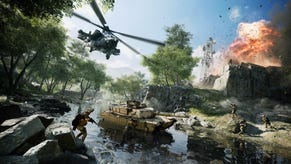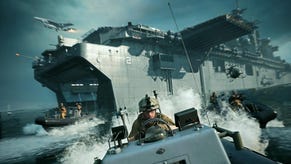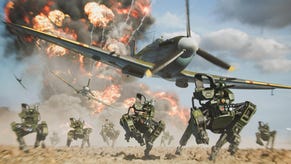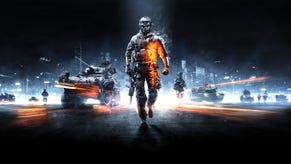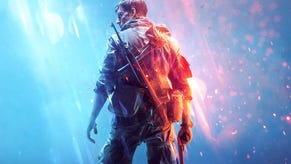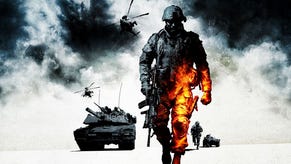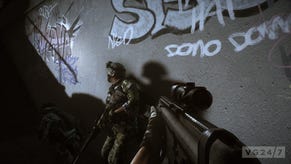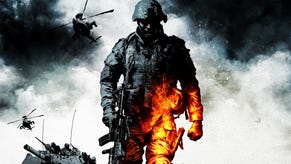Battlefield 3: David Goldfarb spells out single-player
Will BF3's solo-play match its online component for quality? VG247 speaks to the head architect of Battlefield 3's single-player campaign on its tone, length, commitment to sensitivity and more.
There can be little doubt that Battlefield 3 is the hottest core video game in the world right now, at least in terms of anticipation. After a carefully managed campaign of story trailers, multiplayer reveals and show demos on nuclear PCs, the DICE FPS has been pushed up into the very top tier of big budget action games for 2011, vying for control of the shooter category against Infinity Ward's Modern Warfare 3.
But while it's practically unthinkable that the game's multiplayer will be anything less than spectacular, given the studio's long history in the field, there's still a question mark over the single-player component. Graphically, there's no doubt: to argue that Frostbite 2 looks even a shade less than incredible you'd have to be both mad and blind. But has the studio learned from pacing and immersion errors from the Bad Company campaigns to deliver a game-changing solo experience in BF3?
We asked David Goldfarb, the game's lead designer, on a visit to DICE's Stockholm offices this week.
VG247: Battlefield single-player is traditionally not the strongest point of the franchise: it's been multiplayer-focused right from the start. How are you coping with the pressure of creating the campaign?
David Goldfarb: I think we have a pretty good history having worked on Bad Company 1 and 2, but we know as a studio we've only made two single-player shooters and we have God knows how many multiplayer titles. We're well aware of what our strengths and weaknesses are. We do a couple of things; firstly, we do rely on multiplayer when it comes to mechanics. That's the best way of getting the stupid out is to have a bunch of people play it. That's where our core comes from in terms of movement and firing, and all that stuff.
And then because that is what it is, when it comes to making single-player, we're well aware that we're well ahead in many ways of multiplayer than we are in single-player, but that doesn't mean we're any less ambitious in single-player.
Up to this point, Battlefield has been very much a fan-focused franchise. DICE takes a lot of care with listening to its fans. The IP is now being accelerated into this very top tier, this quadruple-A category, and you must be very aware of the type of product you need in terms of single-player to succeed. Even though you're pulling these elements of multiplayer, how aware are you that you have to lean on that really big, cinematic experience that you haven't provided before?
Even when we did BC2, there were things we didn't do there that we were going to have to do when we did the next one, and not just because we were competing with others, but because we want to get better. There are things that we've done this time around that are miles ahead of where we were in BC2 when it comes to interactive storytelling, or the integration of cut-scenes and gameplay. In the past we'd split them, and they're hard. All that stuff; the way we're dealing with animation and so on; all these systems which we had compartmentalized are now part of creating this dramatic experience that we know we need to create to satisfy ourselves more than anyone else.
How much of an edge do you think Frostbite 2 gives you in terms of creating this top tier single-player experience?
Quite a bit. I mean, there's a lot of stuff; there's workflow and everything, but there's sound, and animation is a huge part of it, as is lighting. The best thing is when people look at what we've done and they don't actually know why it feels real. We always get feedback, with people saying, 'This feels more real than other stuff, but we don't know why.' Its because all those things are working together in harmony, and I think it's because Frostbite's a big part of how that feels to people.
"That sniper section on the roof from the Faultline stuff earlier this year? That s**t took forever to get right."
What did you learn from the Bad Company games in terms of storytelling? They're quite flippant and jokey, and Battlefield 3 really isn't. Do you see this as a continuation, or is this something new?
Having worked on both and having written for both, I think it was really clear when I started that we were making something completely different. The biggest challenge, actually, was, 'How's this going to feel different from those guys, because we don't want to make Bad Company 3 now; we want to make Battlefield 3 now."
We had to reboot everything, and ask what was going to make the franchise different this time. There was also a conscious articulation of the values that it would take to make that break. It's not that the guys we have now aren't funny sometimes, or that there aren't moments that aren't humourous I guess, but the context is completely different. The stakes are much, much higher. We are trying to be authentic and grounded in a way that we never even came close to before. I think that's the thing we're trying to be honest with ourselves about when we make this game: it is going to be, in some cases, scary to people that we're doing the things we're doing, but that's where we are.
I think a lot of your fans are concerned that you might chase the competition and go for this completely ridiculous storyline, with space stations exploding and so on.
We aren't doing that. It's not about the competition. You're always aware of what other people are doing, but I know I feel that when we made this game, there's a certain point at which it becomes unbelievable. I think it's really important for myself and for others to keep it within that place where it feels current and plausible, and to me there's a very fine balance. We need to make it feel as though you could read a paper and feel this could have happened. That's what's actually informing the requirements of the story: even if it is ridiculous, would you buy it in a credibility sense? That's been a big part of why we've done stuff. And it has been very different in that way.
You're creating a contemporary story in a believable warzone, and you have things in there like earthquakes. These things are very topical, and what's happening in the Middle East is extremely topical at the moment. How wary are you of crossing that line between wanting to sell a video game and keeping it in good taste?
I would say very. I've said this before, I guess, but it's not about religions, or populations of people and it's not about countries. It is fiction, and in that way it's something that, while we acknowledge it as fiction, we have to be very cautious about what it suggests because people will take it in a certain way. We're really trying to make it feel real, but at the same time we have an obligation to not demonize people or places, and I think that's something that's really important to us.
How do you actually check that? Is this just an internal thing?
Yeah. I mean, there's definitely stuff in that that we know's going to make people go, 'Woah. They did that?' And I think we feel strongly about those moments, because ultimately it's about characters, and it's not about pointing the finger at a group of people. We're all pretty sensitive to that stuff.
Talking about the technicalities of the game itself: is it right that the co-op and single-player maps are completely different to the multiplayer maps?
They're completely different, and they're all completely different from one another.
Can you explain the reasoning behind that? Why have you kept the two completely separate?
Single-player has its own campaign arc, and multiplayer has its arc, which uses some of the context of the SP but in its own way. MP shares some of the context of SP, but has, in some cases, broken free of that. We do all share the same context, but with MP we look forward into the future, to what might happen, and so we give people a bit more of a fantasy. I guess you could say that MP might be where SP leaves off in some cases. The reasoning is to give people enough latitude as they can have to design the maps.
How long is the campaign, roughly?
I can't actually tell you right now, but I would say it's a pretty decent length. It's not Skyrim, but it's not three hours, or anything like that. I'm not sure, as we're still working on the difficulty balancing, and that seems to make the pendulum swing quite a bit.
For the sake of argument, would you say it's a more substantial experience than, say, Modern Warfare 2?
How long was Modern Warfare 2?
I think I finished it in about six hours.
I'd say it was probably slightly more than that. Based on our play-times it's probably more than that, but it's not twice as long. But, again, we'll see. When you play it on hard difficulty, it'll take a lot more time.
It's all about making sure the experience is as awesome as possible. I'd rather have six hours of awesome than 12 hours of "meh".
Is there going to be much replayability in the single-player? If there's one thing the Call of Duty campaigns are guilty of is that you play it and that's it. Do you intend for people to go back?
I think some people will. In terms or persistence, we have no done that for it, but I think we have some pretty cool achievements that people will want to go back and get. It's not like an RPG in that way, but we have tried to incentivize people to come back and play on different difficulties, and so on.
"We're looking for a broad pacing, from 1-10 as opposed to 10-11. I think that's a pretty big deal for shooters, to try to do that kind of pacing, to have it be slow for a little while and to make people wait. That's much harder than we thought it was."
Where do you think you're pushing the envelope in terms of interactive storytelling?
It's interesting. I think it's more about tone than anything else for us. To use the example of Modern Warfare: they're doing things their way and they're awesome at that, but we wanted to do things our way, and we hope that we're awesome at that. And that means we're doing Generation Kill and 24; that's closer to what we're doing, I think. They may be weird bedfellows, but we are looking for a broad pacing, from 1-10 as opposed to 10-11. I think that's a pretty big deal for shooters, to try to do that kind of pacing, to have it be slow for a little while and to make people wait. That's much harder than we thought it was.
For example, that sniper section on the roof from the Faultline stuff earlier this year? That s**t took forever to get right. Just the first six minutes where you don't fire a shot took a long time to make it be good. People were like, "That's awesome. I didn't do anything for six minutes." But do you think you did? I think that's a big challenge. It's a challenge for all the disciplines. It sounds weird to say that we've succeeded in making you appreciate that nothing is happening for six minutes, but it's a big deal.
Obviously, there's stuff that's much more about action, but I think it's really a tone thing. That encompasses a lot of stuff.
Are you thinking in terms of story-based DLC? Obviously, DICE is famed for its multiplayer add-ons, but do you have plans for single-player additions with Battlefield 3?
We talked about it. I don't think we've made any decisions. The issue with single-player DLC is just how much value you get out of the investment from a studio perspective. It's a huge investment to make single-player content, and then it's gone. We have talked about it, but I don't know. It's certainly something that, I'm sure, will come up in the future, but we haven't made any kind of decision that way for that reason.
If there's one thing that gets leveled at story-based campaigns is a question of variation. How mindful were you of that?
Very. When we did BC2, I'd compare it to Diablo II, where they change your environment every 15 minutes. That was there thing. We did it to excess, almost, in BC2. This time around, one of the things with being more realistic and credible is that we do keep you in a area longer than we did in BC2 because everything's happening in that area, but the area itself is sub-divided and you get a very different feeling in different space. So yeah, we're pretty conscious of that. We did everything we could.
Battlefield 3 releases in late October for PC, PS3 and 360.




